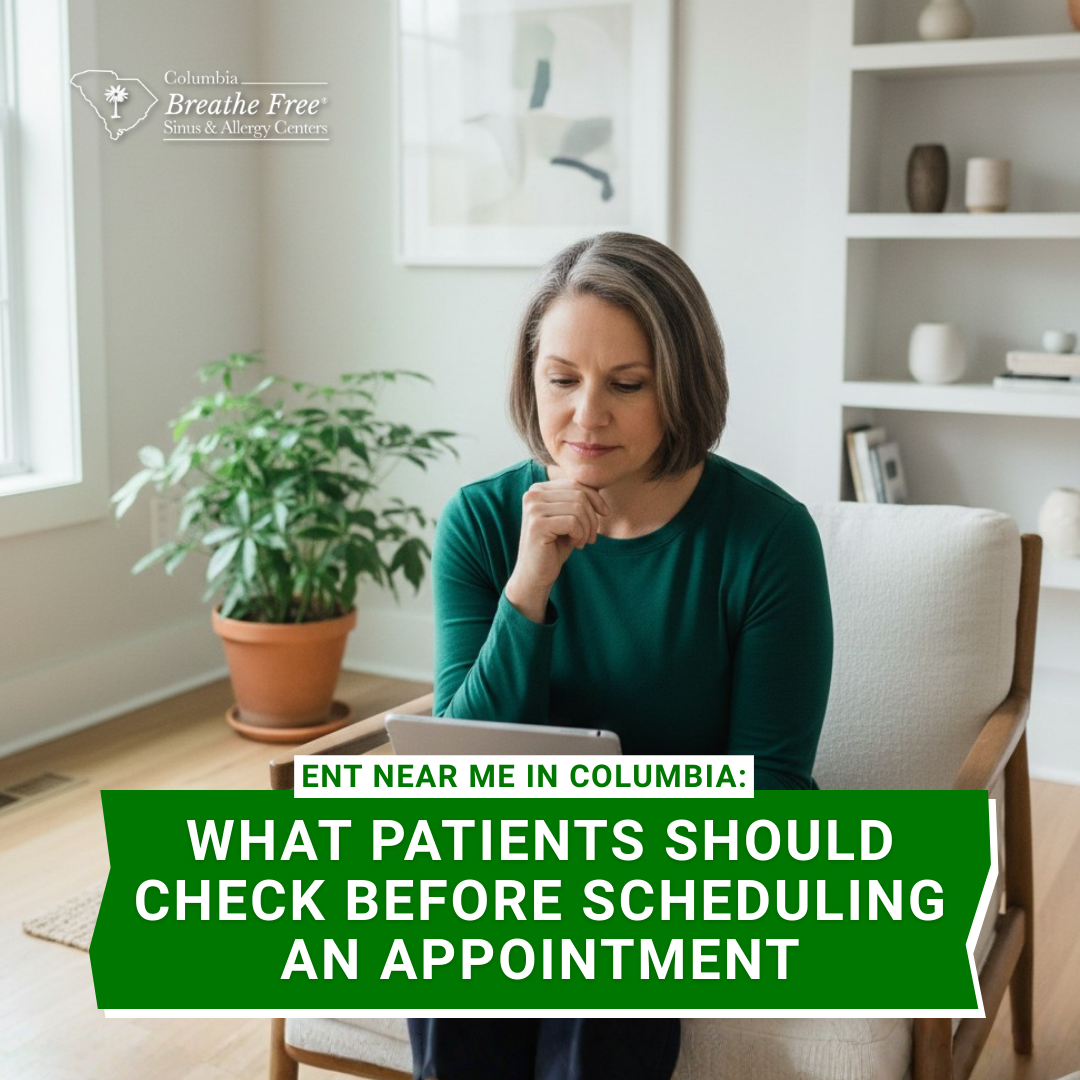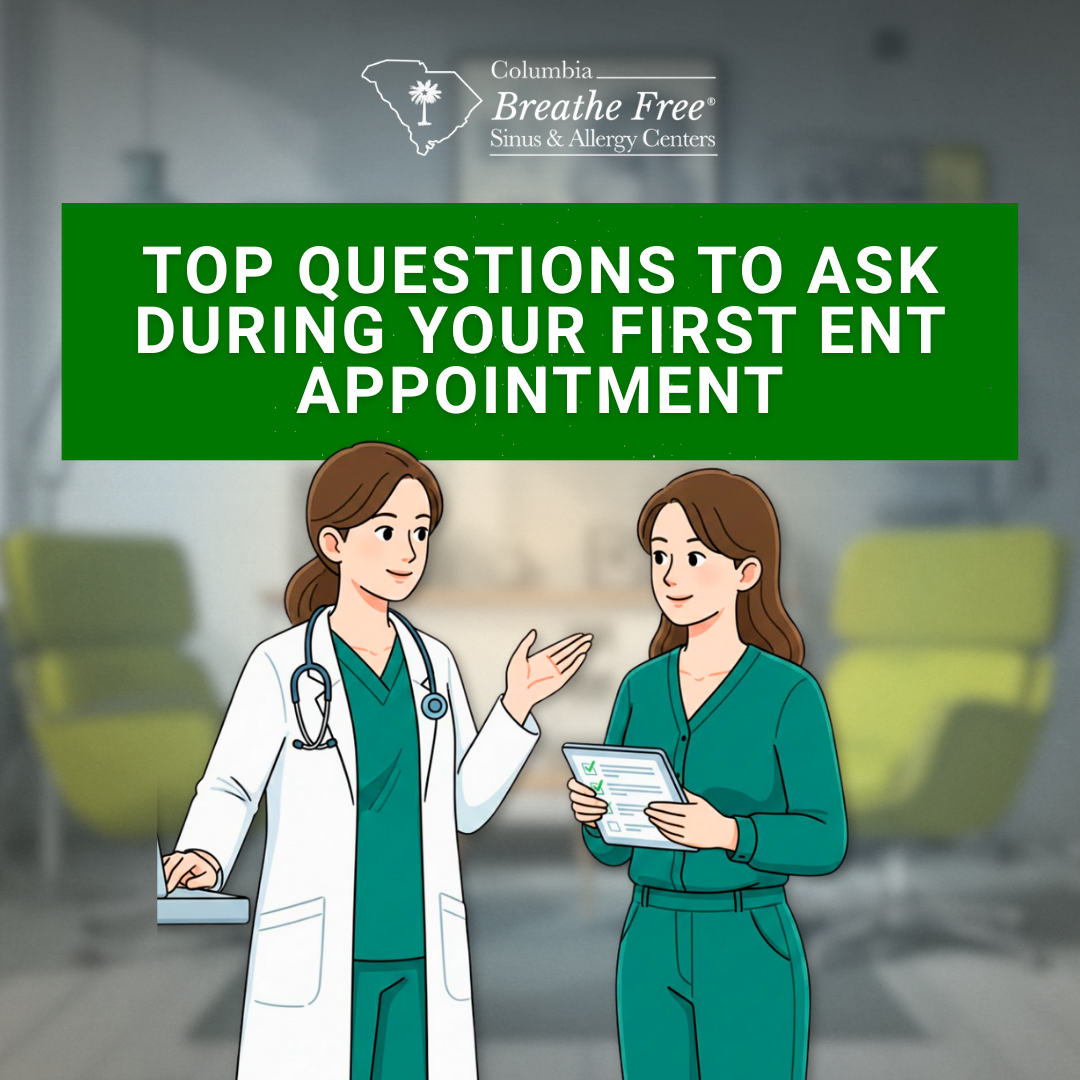.png)
How Columbia’s Humidity Affects Your Sinus Health
If you’ve ever stepped outside on a summer day in Columbia, South Carolina, you know just how heavy the air can feel. That sticky, humid weather is part of life here — but it’s also a common factor behind seasonal sinus flare-ups.
At Columbia Breathe Free Sinus & Allergy Center, we hear from a lot of local patients who struggle with sinus pressure, congestion, and headaches during hot, humid months. There’s a clear connection between Columbia’s humidity and sinus health.
Let’s break down why that happens — and what you can do to support your sinus wellness this summer in Columbia, SC.

Why Humidity Triggers Sinus Trouble
Your sinuses are small air-filled spaces behind your forehead, nose, and cheeks. They’re lined with thin tissue that makes mucus to trap dirt and germs. This mucus drains out through tiny openings in your nose.
In humid weather, a few things can interfere with this process:
- Thick, heavy air may hinder sinus drainage
- Allergens and mold grow more easily in warm, damp conditions
- Swelling from heat or allergies can block airflow
Together, these factors can lead to congestion, fatigue, and discomfort. That’s why humidity-related sinus issues in Columbia are especially common during the summer.
Common Summer Sinus Symptoms
Not sure if the weather is affecting your sinuses? Watch for these signs:
- A constant stuffy or runny nose
- Sinus pressure or pain around the eyes and forehead
- Post-nasal drip (mucus running down the back of your throat)
- Headaches that worsen in the heat
- Trouble breathing through your nose
- Fatigue or feeling foggy
If you notice these symptoms during Columbia’s humid season, it may be time to talk with a Columbia ENT specialist.
Tips to manage Sinus Symptoms in Humid Weather
You don’t have to hide indoors all summer. These simple steps can help reduce sinus irritation:
- Use a dehumidifier inside your home to keep indoor humidity levels between 30–50%.
- Run air conditioning to cool and slightly dry the indoor air.
- Keep windows closed on especially humid days to avoid bringing in outdoor moisture.
- Rinse sinuses daily with saline to help remove allergens and excess mucus
- Shower after being outside to remove pollen, sweat, and other irritants from your skin and hair.
- Stay hydrated to help thin mucus and promote sinus drainage
Consistent habits like these may reduce the frequency or severity of sinus symptoms during Columbia’s humid season.
When to Call a Columbia ENT
If sinus problems are interfering with your daily life — or if symptoms stick around for weeks — it may be time to see a doctor.
At Columbia Breathe Free Sinus & Allergy Centers, we work with patients throughout the Columbia area to better understand what’s contributing to their sinus challenges. Whether it’s allergies, inflammation, or structural concerns inside the nose, our team offers evaluations and a range of treatment options tailored to individual needs.
You don’t have to rely on over-the-counter remedies alone.
Don’t Let the Weather Win
Columbia’s humidity is here to stay — but persistent sinus symptoms don’t have to be. If your discomfort is dragging on this summer, it might be time to get answers and explore treatment options.
Call Columbia Breathe Free today and take the first step toward clearer breathing, fewer headaches, and feeling like yourself again.
Other Blogs

5 Signs It’s Time to See an ENT (and Not Just Your Primary Doctor)
If you’ve ever dealt with persistent ENT issues like chronic nasal congestion, recurring ear infections, severe sinus pain and pressure, and hearing difficulties, then you know how they may affect your daily life, productivity, and comfort, depending on their severity. Many patients today are taking a more proactive approach to their health and may choose to seek care when they notice persistent or worsening symptoms.

ENT Near Me in Columbia: What Patients Should Check Before Scheduling an Appointment
Searching for an “ENT near me” in Columbia often means you’re dealing with ongoing ear, nose, throat, allergy, or sinus concerns. This article explains what ENT providers typically evaluate and how local environmental factors may influence symptoms, along with what to expect during an ENT visit and how treatment options are commonly discussed. It also covers practical considerations before scheduling, including services offered, insurance, accessibility, and appointment availability, and highlights how Columbia Breathe Free helps patients take informed first steps toward understanding and managing persistent ENT, allergy, and sinus symptoms.

Top Questions to Ask During Your First ENT Appointment
A first visit to an ENT specialist can feel overwhelming, especially when dealing with ongoing ear, nose, or throat symptoms. This blog outlines key questions patients may consider asking during their first ENT appointment, including topics related to diagnosis, treatment options, symptom impact, and costs. It also offers practical guidance on how to prepare for an ENT visit and what to expect, helping patients in Columbia, SC make the most of their initial consultation.
The information provided in this article is for informational and educational purposes only and does not constitute medical advice. It is not intended to diagnose, treat, cure, or prevent any disease or medical condition. Always seek the guidance of your physician or other qualified healthcare provider with any questions you may have regarding a medical condition or treatment.
Results may vary: Treatment outcomes and health experiences may differ based on individual medical history, condition severity, and response to care.
Emergency Notice: If you are experiencing a medical emergency, call 911 or seek immediate medical attention.
